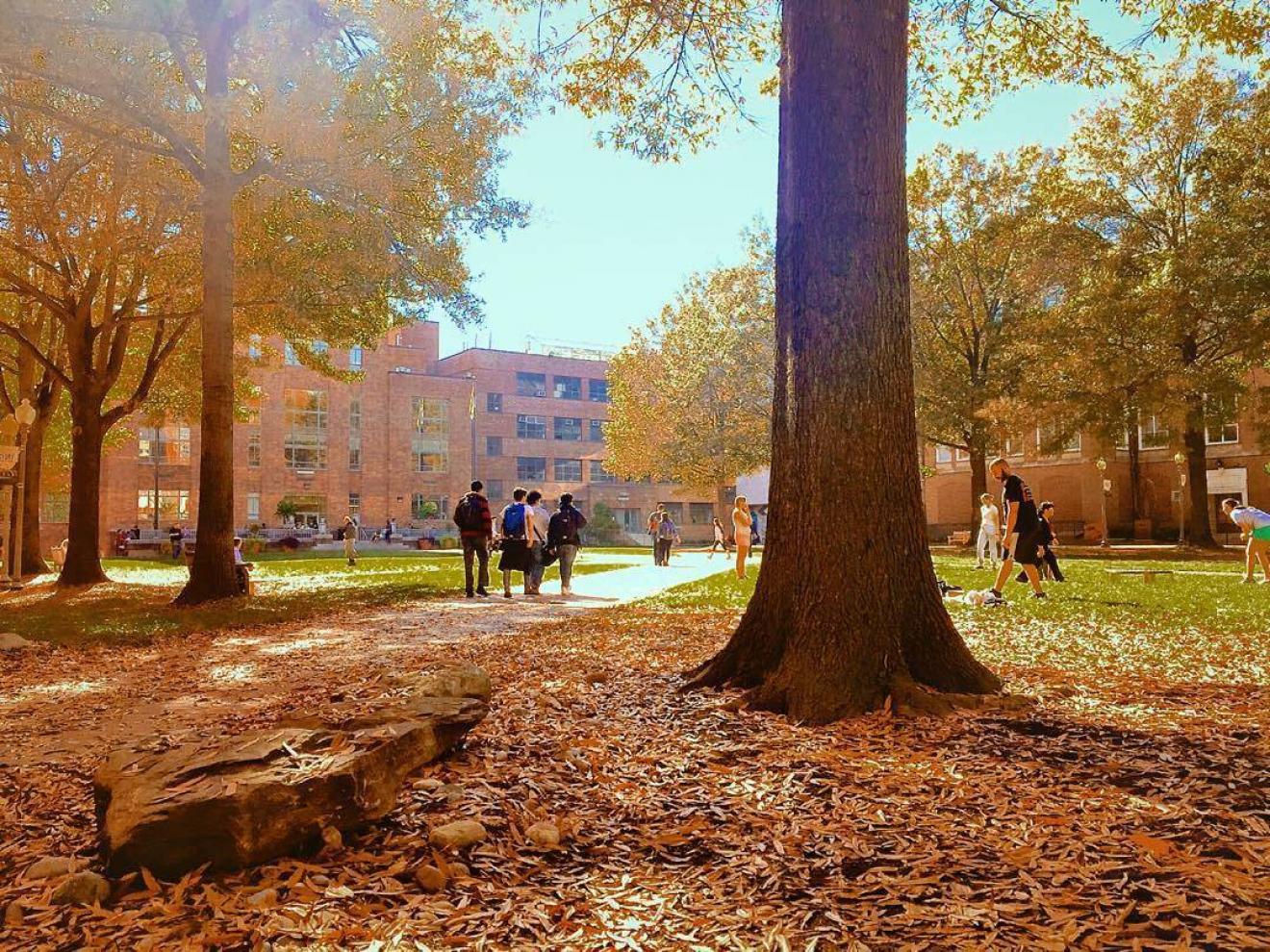Criminal Justice Degree Colleges
A criminal justice degree gives you the chance to study criminal behavior and activity, social policy, crime control, qualitative analytical methods, laws and policing ethics, and beyond. In a criminal justice degree program, you'll learn how social issues and inequalities, including those related to race, gender, class, age, and sexuality, shape the criminal justice system and public perceptions of justice.
With a criminal justice degree, you can pursue a wide variety of careers depending on your level of training and interests. Many degree-holders move on to careers in law enforcement, corrections, and criminology. Depending on the criminal justice program you choose, you can also become a competitive candidate for careers in social work and criminal or forensic psychology.
If you're ready to learn more about the best in-person and online criminal justice degree programs and rewarding careers for criminal justice graduates, you've come to the right place.
Click Here to See the Best Colleges in the US
Best Criminal Justice colleges in the U.S. for 2025
George Mason University offers 1 Criminal Justice/Safety Studies degree programs. It's a very large, public, four-year university in a large suburb. In 2022, 25 Criminal Justice/Safety Studies students graduated with students earning 25 Master's degrees.
The University of Massachusetts Lowell has online bachelor's and certificate-level programs for students and working professionals looking to further their knowledge of criminal justice. Applicants can choose from shorter-term certificates like cyber security fundamentals and Google IT Support Certificate, or pursue a Bachelor’s of Science in Criminal Justice.
Florida State University is an excellent place to look for students that are interested in learning more about criminal justice and pursuing full-time roles in the sector. Applicants should research ahead to determine whether to enroll in online programs like Florida State’s Bachelor’s of Science in Criminal Justice or get a Bachelor’s of Science in Sociology.

Florida International University offers 4 Criminal Justice/Safety Studies degree programs. It's a very large, public, four-year university in a large suburb. In 2022, 649 Criminal Justice/Safety Studies students graduated with students earning 600 Bachelor's degrees, 44 Master's degrees, and 5 Doctoral degrees.

George Washington University offers 1 Criminal Justice/Safety Studies degree programs. It's a very large, private not-for-profit, four-year university in a large city. In 2022, 79 Criminal Justice/Safety Studies students graduated with students earning 79 Bachelor's degrees.
The University of Nebraska at Omaha provides many online degree options for students and working professionals that want to break into the field of criminal justice. Students can enroll in programs like UN’s Bachelor’s of Science in Cybersecurity program or the BS in Homeland Security and Emergency Management.
University of Nevada Las Vegas' online Criminal Justice program is tailored to working professionals interested in furthering their knowledge in the field without the pain of a commute. Students can participate in virtual lectures on their own time and access faculty and staff resources at the click of a button.
Find local colleges with Criminal Justice majors in the U.S.
Criminal Justice Degree Overview
Those who pursue a career in criminal justice analyze global justice systems to understand how police, legal frameworks, and convicted criminals function in tandem. Students often enroll in courses that cover topics like ethics, demographics, and statistical analysis to learn how the justice system impacts people from varied backgrounds.
Pursuing an online degree in criminal justice can provide students with marketable skills that can land them jobs with a local police force, a federal agency, or a law firm. Since program concentrations can vary, it’s important to understand what post-graduation job placement entails before beginning the application process.
Online Criminal Justice programs provide classroom instruction and coursework for students interested in learning about the legal system, policing techniques, and criminology. Depending on the length of time spent enrolled in online programs, students may gain additional instruction through the pursuit of working internships at police agencies and by conducting academic research with professorial direction.
Pursuing educational opportunities in criminal justice provides the foundational knowledge and skills needed to enter the workforce after graduation and apply to positions at local police departments, or as legal counsel for criminal defendants.
Associate Degree in Criminal Justice
Students interested in completing their education in an economical and expedient manner often enroll in online associate programs to complete their degree in about two years. These programs involve online lectures, virtual collaboration with classmates, and testing that can be completed from the comfort of your home.
A criminal justice associate degree serves as an excellent introduction to the field. These two-year degrees typically cover the basics of the theory, history, and practice of criminal law. They can be quite helpful experiences for students trying to figure out which area of the criminal justice career field they would like to pursue a career. Students also take classes on social work, public safety, and crime scene investigation.
What you might not know is that you can qualify for many entry-level positions in criminal justice with only an associate degree. According to the Bureau of Labor Statistics (BLS), this degree can position you for work as a police officer, detective, correctional officer, bailiff, and more.
Bachelor's Degree in Criminal Justice
For those looking to pursue a traditional bachelor’s track in criminal justice, four-year options are available for students interested in online coursework. A bachelor’s degree furthers a student’s opportunity for classroom instruction and research alongside their peers, and can be managed while working a full-time job if taken asynchronously. Bachelor’s programs often require general education requirements such as English and mathematics, along with criminal justice courses like policing and probationary procedures.
A bachelor's degree in criminal justice includes both general education coursework in addition to criminal justice major courses. You'll study ethics, criminal law, social behavior, research methods, and political science topics more in-depth than in associate programs. These criminal justice programs typically take four years to complete.
A bachelor's degree in criminal justice can lead to exciting career opportunities in the field. You can move on to positions as a security officer, fraud investigator, detective, police officer, and much more. Upon graduation, you'll qualify for similar jobs as associate degree-holders but your additional education and training can help you compete for better pay and entry- to mid-level positions in the field.
Master's Degree in Criminal Justice
Students that hope to increase their academic research experience and collaborate with faculty members should consider an online master’s program in criminal justice. While program length can vary from one to two years, these can be attractive for graduates looking to further their knowledge and gain experience in a specific field like criminal justice while holding a full-time job. Online classroom instruction and collaboration give students the flexibility needed to get their degree on their own time.
Many MA programs prepare you for roles in law enforcement agencies, national security, corrections, crime prevention, and victim advocacy. Upon completion of a master's degree, you may also qualify for some other career options including research- or teaching-based positions in academic or criminal justice organizations, according to BLS.
Most full-time students can complete these graduate degrees in two years or less. Compared to associate and bachelor's degrees in criminal justice, master's programs typically require students to complete a traditional thesis or final project in addition to an internship.
Doctoral Degree in Criminal Justice
There are several types of doctoral degrees related to criminal justice, but two stand out as the most common and directly connected to the field: the doctor of criminal justice (DJC) and the doctor of philosophy (PhD) in criminal justice. The degrees may sound alike, but they are designed for different types of criminal justice students.
It's easiest to think of the DCJ as an in-practice, leadership, or criminal justice policy-focused degree. The PhD, on the other hand, is largely for researchers and educators who want to work for universities, research institutions, and public advocacy groups. Other popular doctoral degrees related to criminal justice include the doctor of psychology (PsyD) in criminal justice, juris doctor (JD), and doctor of public administration (DPA). Depending on the program, doctoral degrees can take 3-7 years to complete.
Certification and Licensure in Criminal Justice
Graduates interested in attaining relevant certificates that can be applied in the workplace can pursue a Certified Criminal Analyst certification or take a class to become a Certified Criminal Justice Professional to name a couple. These certificates allow recent graduates and working professionals to gain tangible skills and relevant knowledge that can be applied directly to their current roles.
What Can I Do with a Degree in Criminal Justice?
While there are many different career paths you can take with a criminal justice degree, it's best to pursue an education with some sort of career in mind. This way you'll be able to pick a school and electives that support that effort.
The criminal justice sector employs professionals like private investigators, federal agents, and lawyers that work within the parameters of the justice system and the law. While salaries range depending on the level of education achieved and seniority within an organization, private investigators gross on average $53,000, according to the Bureau of Labor and Statistics.
Many students study criminal justice to prepare for careers as police officers or detectives. About 77% of police and detectives work at the local government level and earn a median annual salary of $65,850.
Policing and detective positions can lead to higher-level positions at the state and federal levels. With several years of experience, criminal justice professionals can also find work with specialized agencies with the federal government, including the Department of Homeland Security, the Federal Bureau of Investigation, and the Drug Enforcement Administration. Only about 8% of criminal justice professionals trained in law enforcement and investigation work for the federal government. These workers make a median annual salary of $92,080.
For criminal justice professionals with a master's or doctorate in criminal justice, becoming a college teacher may be a rewarding option that puts their teaching and research skills to work. According to the Bureau of Labor Statistics (BLS), postsecondary teachers in these roles make a median annual salary of $63,560.
Earning an Online Criminal Justice Degree
There are many key differences between pursuing an online criminal justice degree compared to in-person instruction. Online courses can provide added flexibility for those that prefer to watch lectures, complete assignments, and take tests at their leisure without the strain of commuting and sitting in lecture halls.
While in-person instruction can allow students to attain hands-on lab time and develop professional relationships with their professors, online courses deliver the same content that is presented in the classroom while giving students and working adults the time they need to balance their working lives with their studies.
Criminal Justice FAQ
Expert Testimonials
Joseph Gutheinz of Gutheinz Law Firm, LLP has a BA, MA, and Teaching Credential in Criminal Justice as well as 4 other degrees including a law degree. He has taught over 200 criminal justice and law courses for three colleges and a law school and is a retired Federal law enforcement officer and a practicing criminal defense lawyer.
What is criminal justice?
Criminal justice is a field of study designed to bring justice to wrongdoers and victims alike. It generally encompasses three major divisions: law enforcement, the courts, and corrections.
What does a criminal justice degree teach you?
Fundamentally, a criminal justice degree teaches individuals:
- How to detect and investigate crime
- How to collect and preserve evidence
- How to view the crime scene from both a scientific and psychological perspective
A criminal justice degree teaches would-be law enforcement officers how the courts work and how to efficiently present a case in both a grand jury and petit jury environment. It also teaches would-be law enforcement, probation, and corrections officers about the humane and efficient management of convicted offenders once they have been convicted and placed on either probation, in lockup, or parole. This also often includes individuals who have been diverted away from the courts and or a criminal conviction.
What jobs can I get with a degree in criminal justice?
Speaking from a personal perspective, I have served on state boards, lectured around the country and abroad, served as a Special Agent and Senior Special Agent in three Federal law enforcement agencies, and taught at the college level, all predicated on my criminal justice degrees and what I did with them. My investigations have been featured in an Emmy award-winning documentary, books, and a novel. Having a criminal justice degree also served as my predication to get into law school and earn a law degree.
Do you have any other useful information for prospective criminal justice degree students?
If you're interested in law enforcement, you're on track for an exciting and rewarding career. It is important to maintain a healthy and law-abiding lifestyle or else your opportunities will be limited. Personally, I have never used drugs or alcohol, I ran and exercised every day before I went into law enforcement and after and I kept my eyes on the objective, that being, to serve my community as part of a team of professionals.
List of all Criminal Justice colleges in the U.S.
| School | Average Tuition | Student Teacher Ratio | Enrolled Students | |
|---|---|---|---|---|

|
Northeastern University Boston, MA | 19 : 1 | 30,013 | |

|
American University Washington, DC | 16 : 1 | 13,885 | |

|
George Mason University Fairfax, VA | 27 : 1 | 39,049 | |

|
University of Massachusetts-Lowell Lowell, MA | 27 : 1 | 17,153 | |

|
Florida State University Tallahassee, FL | 28 : 1 | 44,161 | |










